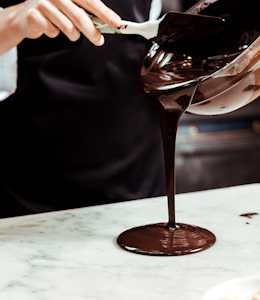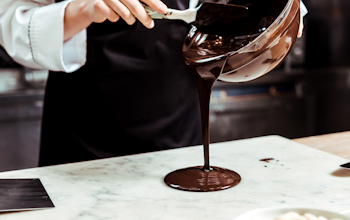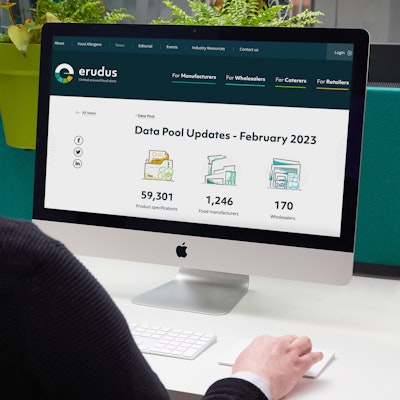People with allergies receive warning from the FSA regarding some imported Dubai-style chocolate products

Dubai-style chocolate may have become a social media mega-hit, but the Food Standards Agency (FSA) are advising that some of these products may not have clear or reliable labels and people with allergies or those purchasing for or giving food to people with allergies need to be careful.
According to the FSA, some of the Dubai-style chocolates may not be intended for sale in the UK and are therefore lacking a full ingredients list of allergen labelling. The UK’s stringent laws on allergen labelling stipulate that labels must list all ingredients and clearly highlight any ingredients among the 14 major food allergens. You can find out more about the 14 major food allergens here.
What are Dubai style chocolates?
Dubai-style chocolates are a social media (specifically, Tik Tok) culinary trend, and are a type of filled chocolate inspired by the Arab dessert Knafeh. The filling typically includes ingredients like pistachios and tahini.
Who is being warned?
The FSA has stated that people with allergies are most at risk of these products but the guidance extends to:
- Food businesses
- Retailers
- Importers
- Consumers
What is the issue with Dubai-style chocolate?
It’s important to note that the issue is not with all Dubai-style chocolate - most of these products available in the UK are safe and adhere to labelling guidelines. However, the FSA have been working alongside local authorities and identified that some of the Dubai-style chocolates may not be labelled in accordance with UK law, and therefore pose a risk to those with allergies.
You may also be interested in…


You may also be interested in…
What to do if your Customer has an Allergic Reaction: Full Guide
ReadSome items may also contain additives and colours which are not permitted to be sold in the UK.
What guidance do the FSA have on the matter?
Put simply, the Food Standards Agency advise that those people with allergies do not purchase these products if they are in doubt, and report any concerns they may have to their Local Authority.
They suggest looking out for the following to check whether a product is intended for sale in the UK, as by law, products made to UK standards should have labels in English providing this information:
You may also be interested in…
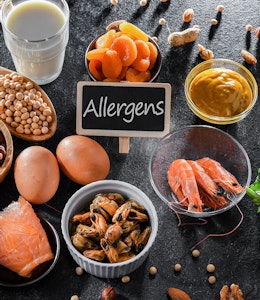
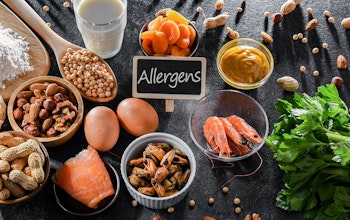
You may also be interested in…
14 Allergens: What to look for on the label
Read- The name of the food (e.g. milk chocolate with pistachio paste filling);
- A list of ingredients, with allergens emphasised;
- The weight of the food in grams;
- A best before or use by date;
- The name and address of the UK or EU business responsible for the product information. If the food is not from the UK or EU, the name and address of the importer must be included.
What further actions are being taken?
The Food Standards Agency has already taken action regarding affected products, and shared concerns with both businesses and industry groups in order to get them removed from physical shelves and online market places.
They are now surveying and sampling the affected products to work out the scale of the issue, and will also be working alongside allergy charities to raise awareness of the matter.
What does the FSA have to say?
Professor Robin May, Chief Scientific Advisor to the FSA issued the following statement:
“The vast majority of food in the UK is safe, but some imported Dubai-style chocolate products don’t meet our standards and could be a food safety risk, especially for consumers with allergies. If you are looking to buy Dubai-style chocolate, we advise sticking with trusted retailers, like the ones you’d use for your weekly shop, as products are more likely to be made for UK consumers and so are safe to eat.
As it’s difficult for consumers to tell the difference between products made for the UK and those that aren’t, if you have a food allergy or intolerance, we advise that you do not buy the product unless you’re certain it’s intended for sale here. UK law requires food labels to highlight any of 14 allergens present in the product, but some imported products may not do this. You can find more information on food.gov.uk.If you have concerns about chocolate that you see on sale, don’t buy it and instead report it to your local authority. We are working closely with local authorities to make sure that any unsafe products are removed from sale as swiftly as possible.”
You can read more on this matter here at the FSA's website.
